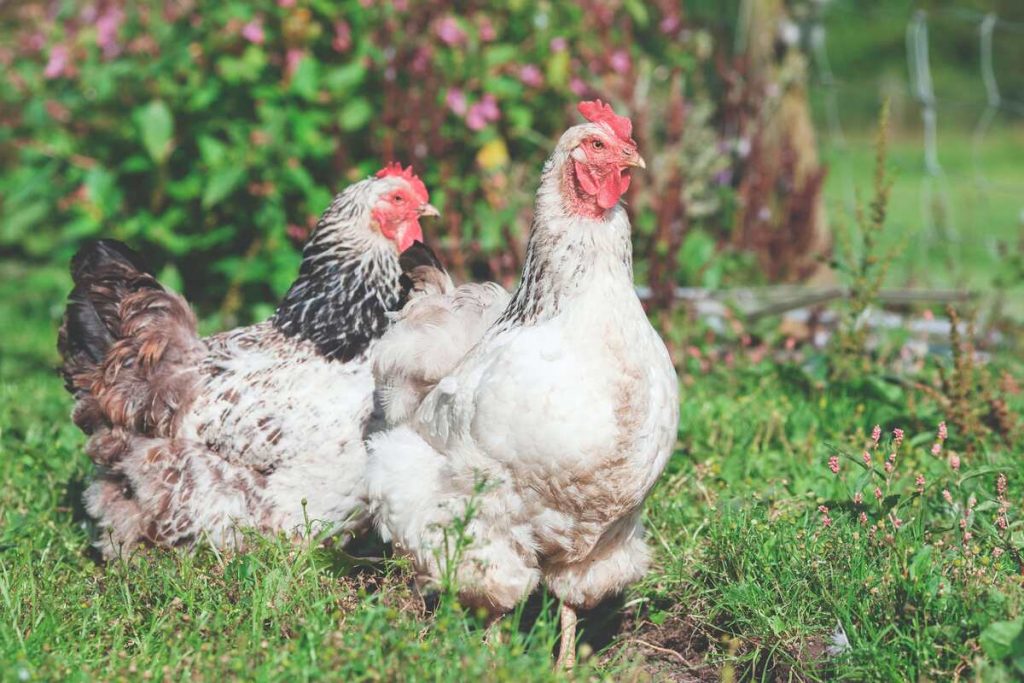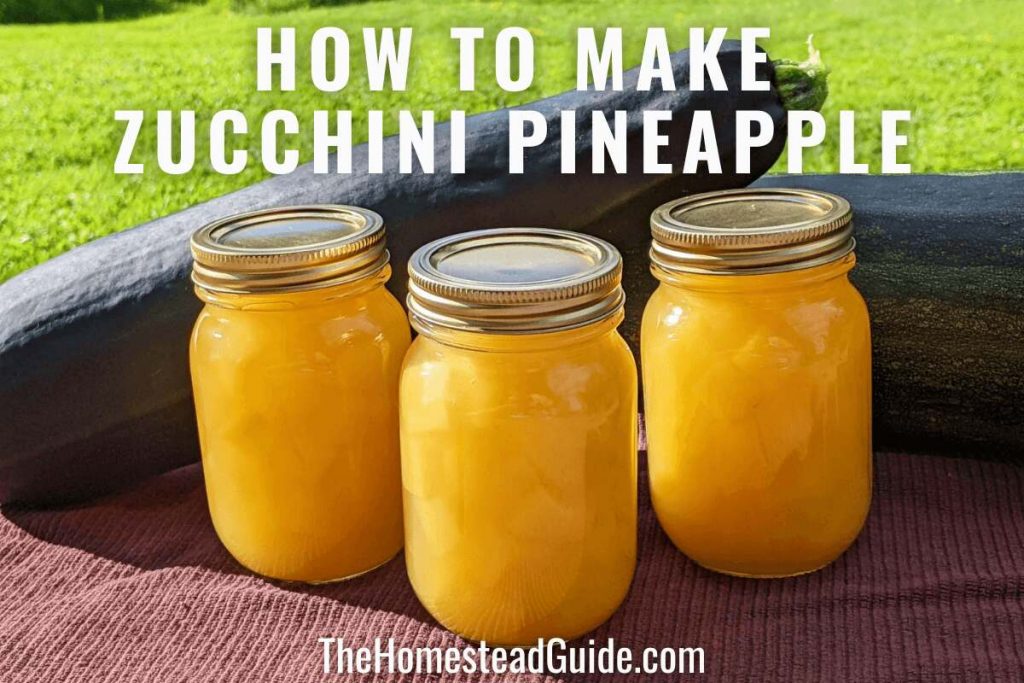Mites, or poultry lice, are a common problem for chicken owners, and finding an effective treatment is crucial for the health and wellbeing of your flock.
If you haven’t yet experienced the panic of seeing tiny black dots crawling all over your poor chickens and causing them to itch themselves uncontrollably, consider yourself lucky! If you’re coming here, though, chances are that you have and were hoping for a quick fix of white vinegar or apple cider vinegar to treat your chickens and want to know the truth: will vinegar kill mites on chickens?
You’re probably looking for a quick answer right away, so here it is:
Vinegar is not an effective treatment for mites on chickens.
While many natural remedies have been suggested for treating mites on chickens such as apple cider vinegar or essential oils, the truth is that these are often misconceptions and are not reliable remedies. In this article, I’ll go over the reasons why vinegar is not an effective treatment for mites on chickens and the best course of action to take if your chickens are suffering from mites.
I’ll touch on some of the alternative remedies that you may come across and some of the reasoning behind them, since there will always be people who swear by them. Some remedies use natural ingredients and some don’t, and we don’t want to be too quick to brush aside the old-timey wisdom of chicken owners from generations long past. After all, people have been dealing with mites or poultry lice for as long as farmed chickens have been a thing!
Keep in mind that I am just another chicken owner on the internet giving you my personal opinion. I am not a vet or a professional, so please make sure to do your own research, even if it does consist of reading people’s recommendations and researching the scientific background on it. I hope to provide enough evidence that can at least prove why this method works and send you in the right direction if you are interested in learning more!
With that being said, I will give you my preferred treatment and the only method I personally recommend, which is the fastest and most effective way to kill mites on chickens. Let’s dive into it!
How can I tell if my chickens have mites?
One of the first signs of mites in chickens is that they will start to scratch and preen excessively. This is because mites feed on your chickens’ blood and cause a lot of irritation and discomfort. Not to mention all those tiny bugs crawling on their sensitive skin have got to be ITCHY!
You might also notice your chickens having a dirty or dusty appearance to their feathers, especially around their necks and vents. This is actually what I noticed first when my flock had a mite infestation. At first, you might pay no attention, especially if your chickens love to dust bathe and frequently are legitimately dirty. However, this just really shows how important it is to closely inspect your chickens regularly, since these things can go unnoticed for a while until the poor birds have mites crawling all over their little faces and feathers falling out.
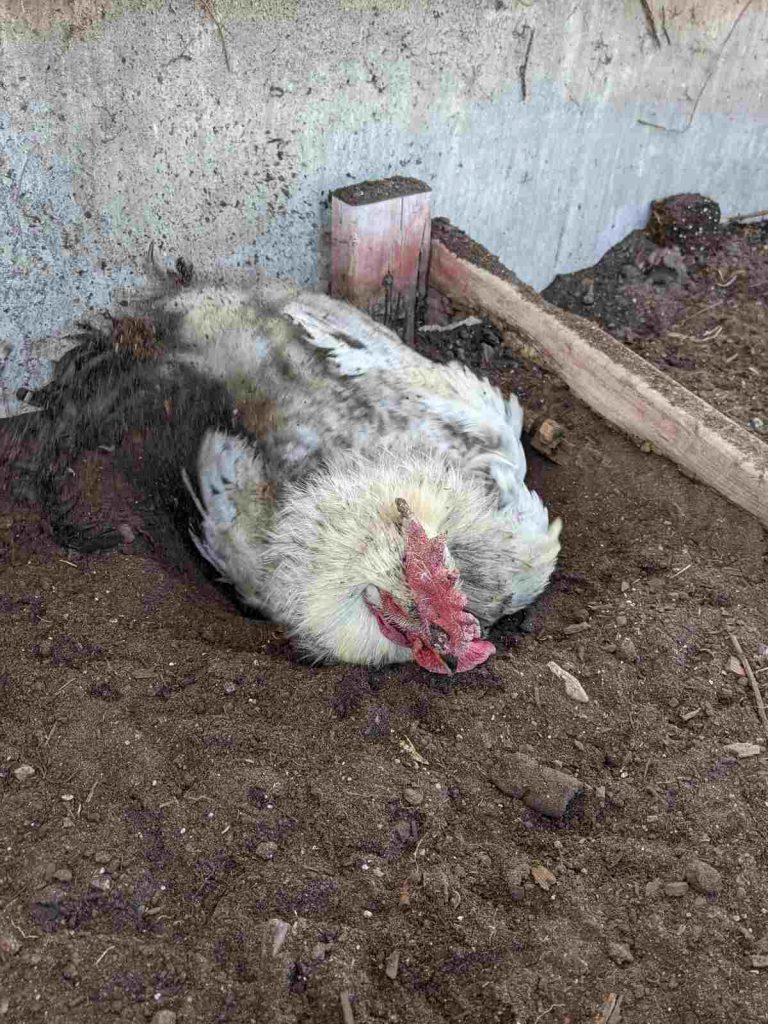
With that last point in mind, you might notice bald patches on your chickens, especially around their back ends. Mites can cause feather loss from the excessive preening and scratching, and in severe cases, can cause anemia, lethargy and reduced egg production. That is why it is so important to treat your whole flock immediately when you notice mites, no matter how few or how many you notice!
Why is vinegar not an effective treatment for mites on chickens?
Although vinegar, whether it’s plain white vinegar or apple cider vinegar, is often touted as a natural remedy for mites on chickens, it is not the most effective treatment out there. In fact, it isn’t going to do much of anything, and may actually do more harm than good.
Vinegar is not effective against mites (or head lice in humans, for that matter) because it cannot penetrate the exoskeleton of the mites, and it is not toxic to them. Additionally, vinegar is an acid and can be irritating to the skin of your chickens, causing further discomfort to already raw and irritated skin. Would you want to pour vinegar or lemon juice over a cut on your own skin? While vinegar may or may not temporarily repel mites (I really don’t think it will), it will certainly not eliminate an infestation. Therefore, it’s important to use an effective treatment with real evidence behind it to treat mites on chickens and prevent further infestations.
So, what’s the best way to kill mites on chickens?
Permethrin. That’s it, that’s the article. Just kidding.
Seriously though, if you want to get rid of your mites as quickly and effectively as possible (and you should – imagine being covered in lice!), do it right and go for the good stuff.
Best treatment for mites on chickens
Now, keep in mind that I am not a professional or a veterinarian. This is my personal opinion based on tons of research plus my own experience. I would always recommend doing your own research for any potential treatments, and consult a local vet if you are still unsure.
With that being said, I’ll let you in on the best (not-so) secret method that tons of chicken owners such as myself swear by when it comes to mites and lice:
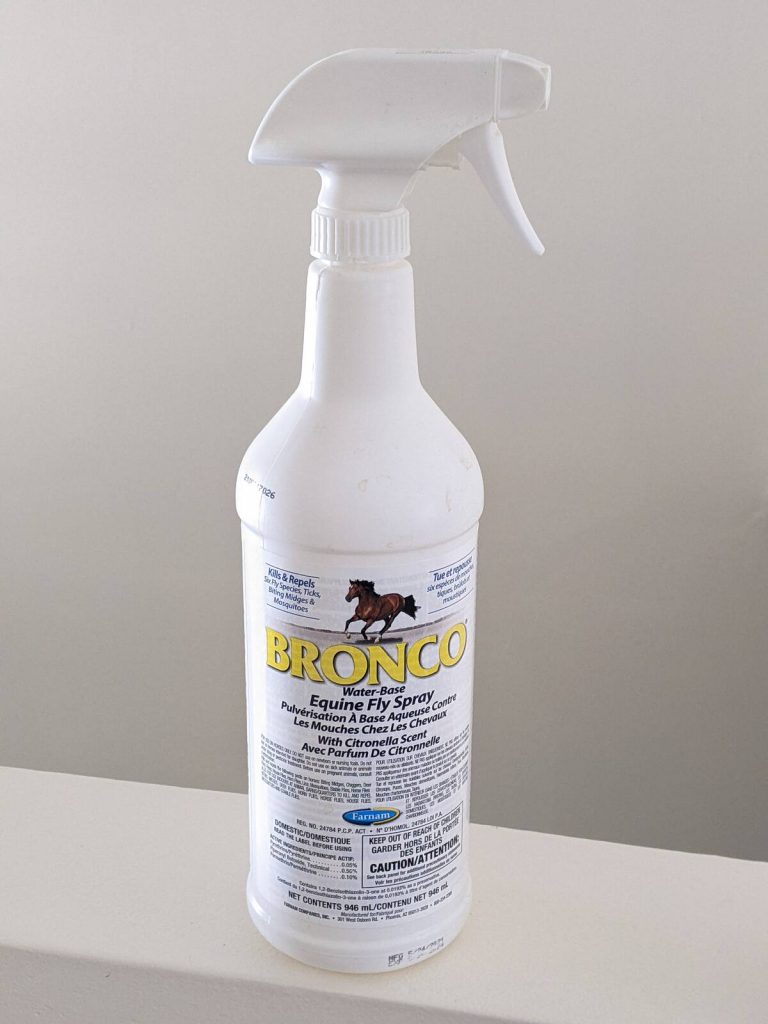
Bronco fly spray. Yes, the one with the horse on it.
You will be amazed at how well this works. You can almost guarantee it will be available at any local tack shop, farm supply store or anything similar. It’s pretty cheap and goes a long way.
The active ingredient is permethrin, which is the same ingredient used to treat head lice in humans, and it comes in a spray bottle where you can control how it sprays out. Here’s a tip: it works great if it sprays out like a jet – you can hit the right areas easily and effectively without too much of it spraying into the air or on the outer feathers.
What is permethrin?
Permethrin is a synthetic insecticide that is widely used to control mites and other pests in agriculture and livestock production. It belongs to a class of chemicals called pyrethroids, and it is a synthetic version of the natural insecticide found in chrysanthemum flowers called pyrethrin. Pyrethrin works the same way but degrades a lot more quickly when exposed to the air, which is why the synthetic version is often used.

Permethrin works by attacking the nervous system of mites and other pests, ulitimately leading to their death. Permethrin is actually included in the World Health Organization’s List of Essential Medicines. However, it’s important to keep in mind that it is a synthetic pesticide (so keep it away from your organic garden), and is classified by the Environmental Protection Agency as “likely to be a carcinogen to humans” but only if swallowed. Don’t let that worry you, though – as long as you are careful and make sure to wash your hands after handling, it is perfectly safe to use to kill mites on chickens.
Permethrin is safe for chickens when used properly, and it is available in spray and powder form. I wouldn’t recommend the powder form, since it gets into the air and poses more of a risk of inhalation and makes more of a mess. A spray is much easier to deal with!
Another word of caution, though, that I have to mention: while permethrin is generally safe for use around birds and dogs, it is extremely toxic to cats and fish. Fortunately, the concentration in fly sprays is so low that you won’t have to worry much about it, but you should still be very cautious if you have cats around, and certainly make sure to wash yourself and your clothes after you’ve treated your chickens. I’d probably even make sure to keep my chickens away from the cat for a few days to a week as well if that were me.
How to kill mites on chickens with permethrin
You really don’t need to use a lot when it comes to killing mites on chickens with permethrin. You want to get between the feathers to reach the skin directly and give a good spritz to the back of the neck, under each wing and around the vent. I give a little spritz to the feet too. The first time I tried it, I was amazed to see how well it worked to kill all those moving little mites. Do not apply near your chickens’ face or eyes, and try to avoid breathing it in yourself.
Depending on the size of your flock, you might want to treat all of your chickens as a preventative measure, and you should repeat this process for a few days to a week to be sure. Make sure to give your coop a good cleaning as well.
How to treat your chicken coop for poultry lice
I would highly recommend spraying down your coop after you clean it. Mites are most active at night; in the day, they hide in cracks and crevices in the wood and then come out at night and crawl up the poor chickens’ legs and onto their bodies. After I cleaned out all the litter and nesting boxes, I gave my coop a big spray-down, focusing on the roosting bars, nesting boxes, and any other cracks and crevices in the coop. Depending on how bad the infestation is, you may need to do this a few times to make sure they’re really dead and gone. Don’t give them anywhere to hide and show no mercy!
Avoid these alternative methods to kill mites on chickens!
These alternative methods range from harmless (but not effective) to somewhat dangerous to either yourself, your chickens or the surrounding environment. There is a lot of conflicting information on the internet about these methods, and this article may even be downright controversial if you ask some people! Still, I stand by my recommendation of permethrin spray and I do not recommend any of the following methods, and I’ll include my reasons why.
Apple cider vinegar
I know I already covered this before, but apple cider vinegar really isn’t this magical heal-all ingredient that a lot of people claim it to be. I hope I don’t offend anyone reading this who swears by it, whether it’s to try and treat mites or to use in their chickens’ diets, but it really is not beneficial for your birds at all, and may in fact cause more problems than solve. Vinegar is not natural to a bird’s diet, so why introduce it? I found a really interesting article that goes into more depth about why you should not give your chickens apple cider vinegar – I think it’s a really good read.
Garlic
So, this isn’t really a method to specifically avoid, but it is more that it just doesn’t do much in terms of getting rid of mites. Some people do claim that garlic juice works to kill mites, but if you ask me, it’s a lot of work and you might end up with nothing but a very pungent-smelling coop! Garlic is said to be great for the immune system, though, so there is certainly nothing wrong with feeding your chickens some raw garlic every once in a while as a healthy supplement. Does it make your eggs taste garlicky? I’ve never actually fed my chickens straight garlic – let me know in the comments!
Diatomaceous earth
This one I am on the fence about. I personally do not use it for anything chicken-related, but there is some information out there about using it to control mites. Being a very fine, dusty substance made up of microscopic sharp pieces, I’d advise caution when working with it – you don’t want yourself or your chickens inhaling it.
Diatomaceous earth works by damaging the exoskeleton of insects and parasites, which causes them to suffocate and dry out. The problem is that it does the same thing to beneficial insects and bacteria, including the beneficial microorganisms that are responsible for breaking down your deep litter bed.
Chickens are always shaking out their feathers and stirring up dust; so again, I’d recommend a direct spray of permethrin in the important areas to effectively treat mites or lice.
Sevin dust (carbaryl)
Again, due to the conflicting information on the internet about whether Sevin dust is or is not safe for chickens, I’d err on the side of caution and avoid it entirely. The active ingredient in Sevin dust is carbaryl and is considered a neurotoxin and a “likely human carcinogen” by the EPA. It is meant to be used on crops and not live animals such as chickens or any other livestock, but even then it is still considered extremely toxic to the wild insect population and to aquatic organisms.
You’ll probably come across a lot of people saying that it is perfectly safe to use on chickens, but I personally would never use it, knowing that it was never made to use around animals in the first place. Definitely stick with a safe, low-concentration permethrin spray.
Final thoughts
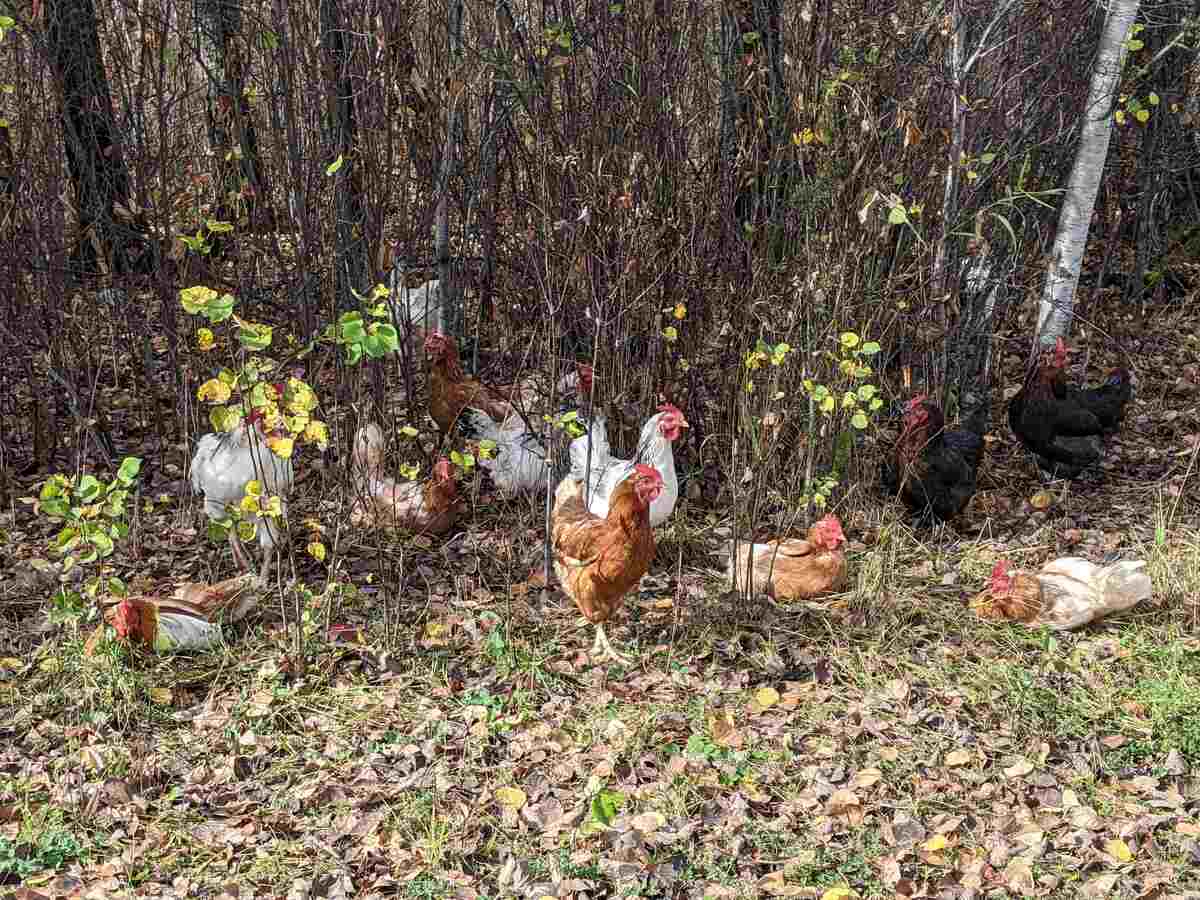
As chicken owners, we want to make sure our birds always feel safe and happy. However, sometimes things like mite infestations happen, and it’s important to know what to do if it does. With so much conflicting information online about whether this or that method really works, it’s best to go right for the proper product right from the start. Permethrin insecticide spray, such as the Bronco fly spray, uses a low concentration of permethrin as the active ingredient, and it works quickly and effectively if you apply to the right areas. Make sure to use the right precautions to keep yourself, your chickens and your pets safe, and make sure to give your coop a deep cleaning and spray treatment to keep the lice away! After I treated my birds and coop with permethrin spray, I am happy to say that the mites have never returned.
Here’s to happy and healthy chickies!

